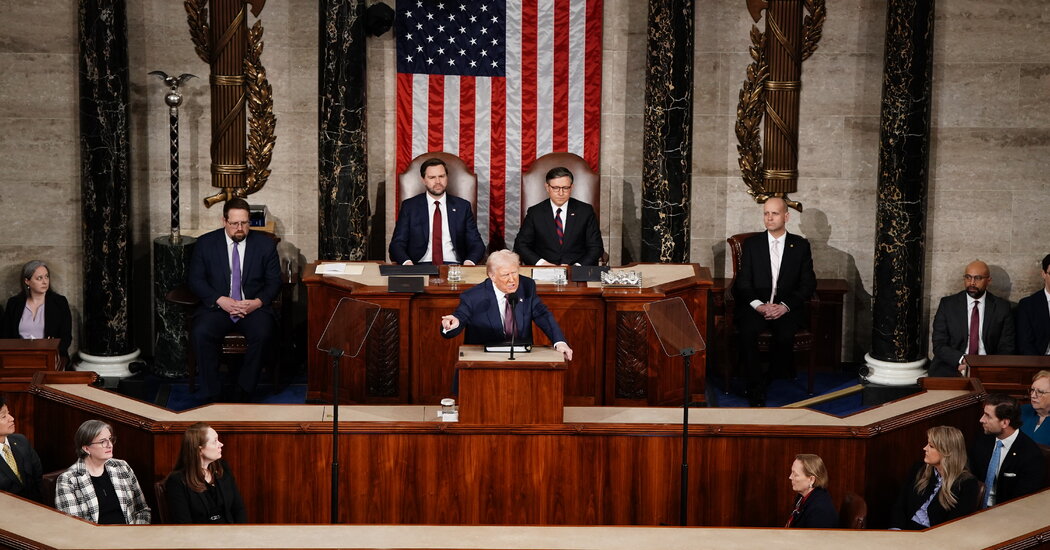Here is the result in plain text:
When the United States signed a free-trade agreement with Canada and Mexico more than 30 years ago, the premise was that partnering with two other thriving economies would also benefit America.
This week, President Trump abruptly scrapped that idea. He imposed a sweeping 25 percent tariff on the roughly $1 trillion of imports that Mexico and Canada send into the United States each year as part of that North American trade pact. Those tariffs are expected to significantly raise costs for Canadian and Mexican exports, undermining their economies and likely pushing them into recession.
Mr. Trump’s decision to unwind decades of economic integration raises big questions about the future of North America and the industries that have been built around the idea of an economically integrated continent. While some factories in Canada and Mexico might move to the United States to avoid tariffs, the levies will also raise costs for American consumers and manufacturers that have come to depend on materials from their North American neighbors.
“This is a day where the United States stopped seeing trade as a force for mutual benefit, and began seeing it as a tool of economic warfare,” said Edward Alden, a senior fellow at the Council on Foreign Relations. He added that the levies were “a fundamental attack on the economic well-being of our closest neighbors.”
Mr. Trump suggested on Wednesday that this arrangement could be long-lived, as he gave automakers who were abiding by the terms of the United States-Mexico-Canada Agreement, or USMCA, only a one-month reprieve to prepare for the tariffs. Trump officials said that the president expected to issue more tariffs on Canada and Mexico next month, when he announces what he is calling “reciprocal” tariff measures.
Mr. Trump defended his tariffs in an address to Congress Tuesday night, saying they were “not just about protecting American jobs — they are about protecting the soul of our country.”
Tariffs are about making America rich again and making America great again, and it is happening and it will happen rather quickly,” he said. “There will be a little disturbance, but we are OK with that. It won’t be much.”
Economists argue that the tariffs could cause major disruptions in Canada and Mexico, because they are so reliant on the U.S. economy. Trade accounts for about a quarter of U.S. economic activity, compared with roughly 70 percent for Mexico and Canada. Canada and Mexico both send about 80 percent of their exports to the United States, while only about a third of U.S. exports go to Canada and Mexico collectively.
Tony Stillo, director of Canada economics at Oxford Economics, estimated that the tariffs would plunge the Canadian economy into recession this year, push consumer price inflation to nearly 4 percent above the previous year, and cause layoffs that would lift the unemployment rate above 8 percent.
“Trump’s trade war will seriously hamper U.S.-Canada relations and severely upend North America’s highly integrated production and supply network, possibly with lasting impacts on both economies,” he said.
Marcus Noland, executive vice president and director of studies at the Peterson Institute for International Economics, estimated that a 25 percent tariff could reduce Mexico’s economic growth about two percentage points, potentially resulting in large-scale factory closures and job losses.
The tariff threats have already convinced some companies to look beyond Mexico.
Randy Carr, the chief executive of World Emblem, which manufactures labels and emblems, including for U.S. military uniforms, FedEx drivers and the National Football League players, said the tariffs had given him a push to set up a secondary factory in the Dominican Republic, in addition to a factory in Mexico.
Mr. Carr said that he would consider bringing manufacturing to the United States if the tariffs stayed in place, but that it would take time and significantly raise the cost of his products. But the threats have also caused him to rethink his plans for the next three years, and pull back on all spending on expansions and hiring.
“We’re sitting on a lot of projects that we can’t otherwise do as a result of just the threat of the tariff,” he said.
As a bigger economy, the United States is more insulated from trade than Canada and Mexico. But slowing America’s biggest export markets will hurt U.S. growth, too, and it will cause more acute pain among communities that depend on those markets. Canada and Mexico are the biggest export markets for many American farmers.
U.S. industries that depend on raw materials from the neighboring countries will also see costs rise, and some of those businesses could shut down as tariffs erase their profit margins. Analysts at S&P Global Ratings said on Thursday they expected the tariffs to decrease U.S. gross domestic product 0.6 percent over the next 12 months, and Canadian and Mexican G.D.P. 2 to 3 percent from their previous forecasts.
The tariffs also effectively shatter a trade deal Mr. Trump himself signed in his first term. When he signed that trade deal in 2020, Mr. Trump called it the “largest, fairest, most balanced and modern trade agreement ever achieved” and a “colossal victory” for farmers and factory workers.
On Wednesday, America’s major automakers issued statements thanking the president for the one-month pause in tariffs. But on a conference call Tuesday, they had told Mr. Trump that putting tariffs on cars and parts from Canada and Mexico would effectively erase all of their companies’ profits by imposing billions of dollars of new costs, according to a person briefed on the call.
The tariffs have also decimated any trust between the governments involved. In response to U.S. requests, Canada tightened its visa rules and deployed personnel, equipment, helicopters and drones along the border. Mexico sent troops to the border and cracked down on drug cartels, including delivering cartel operatives into U.S. custody.
Border crossings plummeted. In the end, none of that mattered.
Prime Minister Justin Trudeau of Canada said in a news conference on Tuesday that Mr. Trump’s rationale for the tariffs was “completely bogus, completely unjustified, completely false.” Mr. Trudeau said he had to assume that what Mr. Trump really wanted was “a total collapse of the Canadian economy” to accomplish an objective the president had talked about repeatedly: annexing Canada.
But, he said, those moves would also drag down the U.S. economy. “A fight with Canada will have no winners,” Mr. Trudeau said.
Some groups had supported Mr. Trump’s tariffs precisely because they wanted to unwind economic integration. The United Auto Workers, which represents mostly American workers, said in a statement that it had seen “the devastating effects of so-called free trade on the working class” for 40 years.
“We are glad to see an American president take aggressive action on ending the free trade disaster that has dropped like a bomb on the working class,” the union said. “The working class suffered all the pain of Nafta, and we won’t suffer all the pain of undoing Nafta.”
But other industries have complained that severing those ties will backfire on Mr. Trump’s aims by hurting American manufacturing and destroying jobs.
The National Council of Textile Organizations, a trade group representing U.S. textile makers, said that imposing tariffs on Canada and Mexico would “benefit China and other Asian countries and harm the U.S. textile industry, which has lost 27 plants in the past 20 months.”
U.S. textile makers ship more than half of their total global textile exports to Mexico and Canada, and those materials often come back as finished products to the United States under the USMCA. Destabilizing this North American production chain would “only exacerbate migration and the fentanyl crisis,” the group said.
Ironically, Mr. Trump said that his efforts to unwind free trade agreements could cause the kind of economic dislocations those agreements caused in the first place, as they destroyed and then recreated new supply chains.
Even if manufacturing jobs increase overall in the United States, he said, certain factories might shut down because they depend on supply chains that run through Canada and Mexico.
“There is going to be significant disruption to regional economies,” he said. “I would worry about the places that are going to be disrupted by this and the long-lived adverse impact.”
Source link




